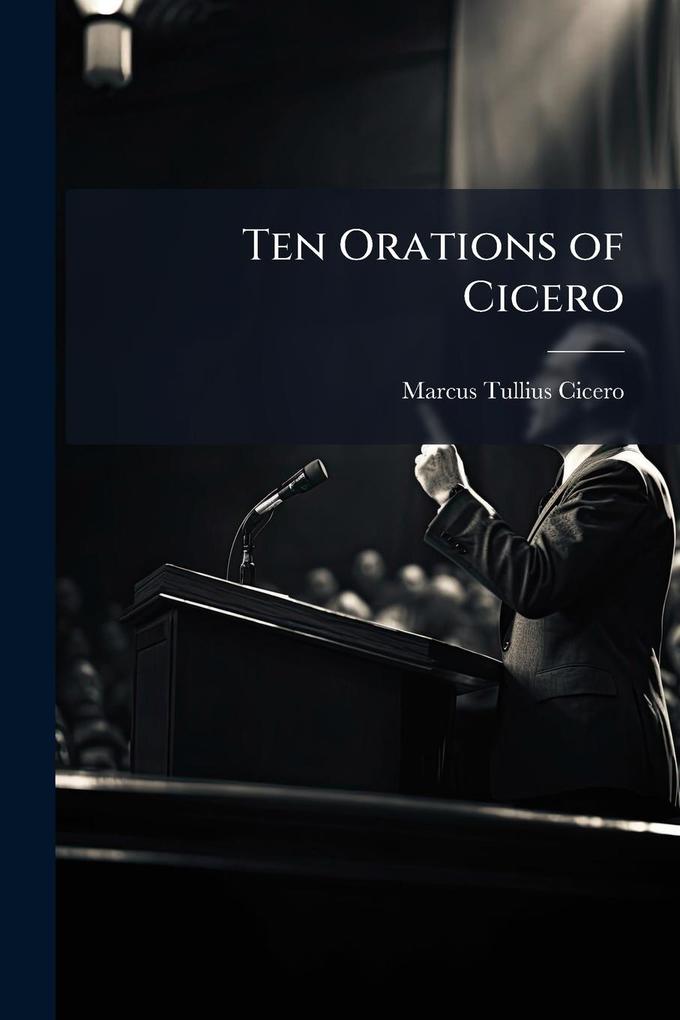
Zustellung: Mo, 21.07. - Fr, 25.07.
Versand in 2 Wochen
VersandkostenfreiBestellen & in Filiale abholen:
This volume presents ten of Cicero's most significant orations, accompanied by selections from his extensive correspondence. Marcus Tullius Cicero (106-43 BC) was a Roman statesman, lawyer, political theorist, and philosopher who is widely considered one of Rome's greatest orators and prose stylists. His speeches offer invaluable insights into the political and social dynamics of the late Roman Republic.
Included are such famous speeches as "In Catilinam I-IV", denouncing the conspiracy of Catiline, as well as "Pro Archia Poeta", a defense of the poet Archias' Roman citizenship. These works showcase Cicero's mastery of rhetoric, his profound understanding of Roman law and politics, and his unwavering commitment to the Republic. The selection of letters provides a more intimate glimpse into Cicero's personal life and thoughts. "Ten Orations of Cicero" remains essential reading for students of classical literature, Roman history, and political thought, providing a window into a pivotal era of Western civilization.
This work has been selected by scholars as being culturally important, and is part of the knowledge base of civilization as we know it. This work was reproduced from the original artifact, and remains as true to the original work as possible. Therefore, you will see the original copyright references, library stamps (as most of these works have been housed in our most important libraries around the world), and other notations in the work.
This work is in the public domain in the United States of America, and possibly other nations. Within the United States, you may freely copy and distribute this work, as no entity (individual or corporate) has a copyright on the body of the work.
As a reproduction of a historical artifact, this work may contain missing or blurred pages, poor pictures, errant marks, etc. Scholars believe, and we concur, that this work is important enough to be preserved, reproduced, and made generally available to the public. We appreciate your support of the preservation process, and thank you for being an important part of keeping this knowledge alive and relevant.
Included are such famous speeches as "In Catilinam I-IV", denouncing the conspiracy of Catiline, as well as "Pro Archia Poeta", a defense of the poet Archias' Roman citizenship. These works showcase Cicero's mastery of rhetoric, his profound understanding of Roman law and politics, and his unwavering commitment to the Republic. The selection of letters provides a more intimate glimpse into Cicero's personal life and thoughts. "Ten Orations of Cicero" remains essential reading for students of classical literature, Roman history, and political thought, providing a window into a pivotal era of Western civilization.
This work has been selected by scholars as being culturally important, and is part of the knowledge base of civilization as we know it. This work was reproduced from the original artifact, and remains as true to the original work as possible. Therefore, you will see the original copyright references, library stamps (as most of these works have been housed in our most important libraries around the world), and other notations in the work.
This work is in the public domain in the United States of America, and possibly other nations. Within the United States, you may freely copy and distribute this work, as no entity (individual or corporate) has a copyright on the body of the work.
As a reproduction of a historical artifact, this work may contain missing or blurred pages, poor pictures, errant marks, etc. Scholars believe, and we concur, that this work is important enough to be preserved, reproduced, and made generally available to the public. We appreciate your support of the preservation process, and thank you for being an important part of keeping this knowledge alive and relevant.
Produktdetails
Erscheinungsdatum
22. Mai 2025
Sprache
englisch
Seitenanzahl
580
Autor/Autorin
Marcus Tullius Cicero
Verlag/Hersteller
Produktart
kartoniert
Gewicht
803 g
Größe (L/B/H)
234/156/30 mm
ISBN
9781023814171
Bewertungen
0 Bewertungen
Es wurden noch keine Bewertungen abgegeben. Schreiben Sie die erste Bewertung zu "Ten Orations of Cicero" und helfen Sie damit anderen bei der Kaufentscheidung.









